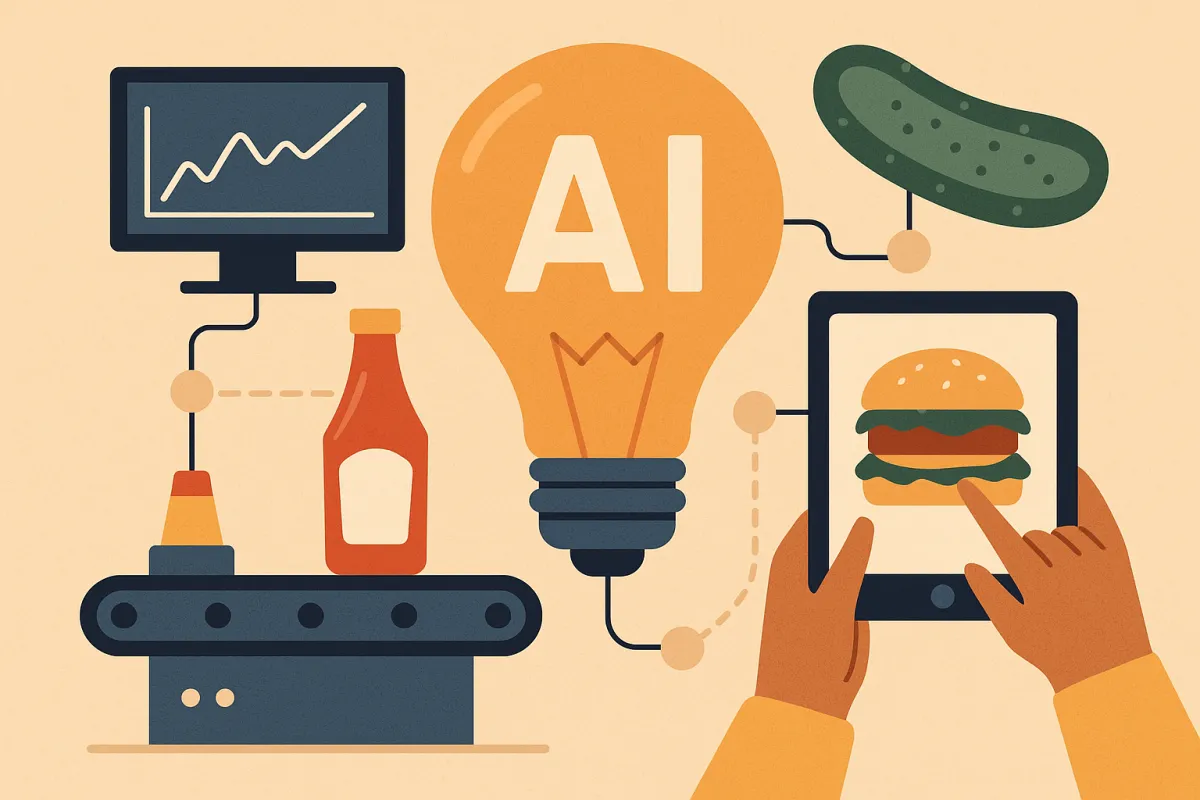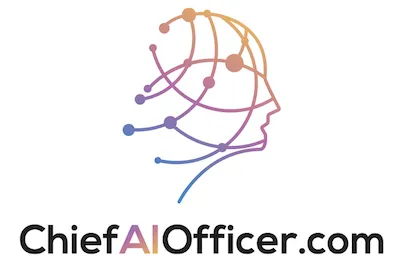
Kraft Heinz's AI Cuts Product Development Time by 50%
Kraft Heinz's AI Cuts Product Development Time by 50%
Most food companies struggle with lengthy product development cycles, inefficient supply chains, and marketing content that takes weeks to create and approve. Kraft Heinz built an AI system that reduces product development time by 50%, slashes creative design timelines by 8x, and operates a self-driving supply chain that boosts production efficiency by 12% while generating over $26 billion in annual revenue.
The transformation is comprehensive. Kraft Heinz doesn't just manufacture food products. They engineer intelligent operations through AI that optimizes supply chains automatically, creates personalized marketing content at scale, and accelerates innovation cycles to deliver products that meet market demands faster than traditional food companies can identify emerging opportunities.
This represents complete food industry evolution that demonstrates how artificial intelligence can eliminate the operational inefficiencies and slow response times that plague traditional consumer goods manufacturing while creating competitive advantages through superior agility and operational excellence.
The Strategic Vision That Revolutionized Food Manufacturing
Kraft Heinz's leadership made a decision that most consumer goods executives struggle to execute: they transformed their entire operation around AI's ability to optimize complex supply chains, accelerate product development, and create personalized marketing content more effectively than traditional manufacturing approaches.
Instead of relying on manual supply chain management and lengthy product development processes, they built AI systems that coordinate production automatically, predict demand patterns, and generate marketing content that maintains brand consistency while enabling rapid market response.
This strategic transformation required fundamental changes to supply chain operations, product development methodologies, and marketing workflows. Traditional food manufacturing operates through manual coordination with reactive problem-solving. Kraft Heinz created AI capabilities that anticipate challenges and optimize operations proactively.
The competitive implications extend beyond operational efficiency to comprehensive business advantages through faster market entry, improved customer satisfaction, and operational leverage that enables aggressive growth strategies and market expansion.
Self-Driving Supply Chain That Operates Autonomously
Kraft Heinz's partnership with Microsoft created the Kraft Heinz Lighthouse control tower that demonstrates advanced supply chain intelligence providing real-time, end-to-end visibility from farm to fork through AI analysis that coordinates complex logistics automatically.
The system aggregates and analyzes supply chain data for predictive demand forecasting, optimized production scheduling, and proactive response to supply disruptions before they affect product availability or customer satisfaction.
This autonomous capability creates operational efficiency that traditional manual coordination cannot achieve while reducing costs and improving reliability through systematic optimization of complex supply chain relationships and dependencies.
The self-driving approach eliminates reactive supply chain management while enabling proactive optimization that maintains product availability and quality standards across diverse market conditions and seasonal demand variations.
AI Vision Systems That Perfect Quality Control
Kraft Heinz's AI vision systems demonstrate sophisticated quality assessment that analyzes cucumbers for Claussen pickles and other ingredients with precision that exceeds human inspection while operating continuously without fatigue or attention lapses.
The computer vision technology identifies quality variations, defects, and optimal processing characteristics that enable precise quality control while reducing waste and increasing production efficiency by 12% through systematic optimization of ingredient utilization.
This quality intelligence ensures consistent product standards while eliminating human error factors and subjective variations that can affect product quality and customer satisfaction in traditional manual inspection processes.
The automated quality control creates operational reliability while improving resource efficiency through systematic waste reduction and optimal ingredient utilization that traditional inspection approaches cannot achieve consistently.
KHAI Internal AI Engine That Empowers Workforce
Kraft Heinz's internal AI engine (KHAI) demonstrates comprehensive workforce empowerment that provides generative AI tools to 13,000 employees worldwide while maintaining enterprise data security and enabling systematic productivity improvements across business functions.
The platform enables employees to leverage AI capabilities for routine tasks, creative development, and decision support while ensuring data security and maintaining consistent application of AI capabilities across diverse operational roles and responsibilities.
This workforce augmentation creates productivity multiplication while enabling employees to focus on strategic thinking and creative problem-solving rather than routine administrative tasks that AI can handle more efficiently.
The systematic AI deployment demonstrates how large organizations can scale AI benefits across entire workforces while maintaining security standards and ensuring consistent value creation through intelligent automation.
TasteMaker RAG Engine That Transforms Creative Development
Kraft Heinz's custom-built TasteMaker RAG engine, developed with Google's Vertex AI, demonstrates advanced creative automation that slashes design timelines by 8x while supporting rapid asset generation for over 100 brands with maintained consistency and security.
The generative AI system creates marketing content, visual assets, and brand communications that maintain brand standards while enabling rapid response to market opportunities and campaign requirements that traditional creative processes cannot match.
This creative intelligence enables personalized marketing at scale while reducing the time and cost barriers that typically limit creative experimentation and market responsiveness in traditional brand management approaches.
The automated creative capability creates competitive advantages through superior marketing agility and content quality while enabling more ambitious creative strategies that traditional resource constraints would prevent.
Agile Innovation Model That Accelerates Product Development
Kraft Heinz's Agile@Scale strategy and pod-based teams demonstrate systematic innovation acceleration that launches new products up to 50% faster while unlocking millions in sales through AI-driven insights that connect directly to product and market development teams.
The agile approach enables rapid iteration and market testing while machine learning supports product reformulation for health and wellness trends including sugar and sodium reduction in global product lines.
This innovation intelligence creates market responsiveness that traditional development cycles cannot achieve while enabling systematic product optimization based on market feedback and health trend analysis.
The accelerated development capability enables capture of market opportunities while competitors are still identifying trends or developing response strategies through conventional product development approaches.
Data Integration That Eliminates Organizational Silos
Kraft Heinz unified its data, digital, and IT functions under a global technology organization that demonstrates systematic information coordination enabling AI applications across business functions while eliminating data silos that limit traditional operational optimization.
The integrated approach ensures that supply chain intelligence informs marketing strategies, product development insights guide manufacturing decisions, and customer intelligence drives operational optimization through coordinated data analysis rather than isolated functional optimization.
This organizational integration creates operational leverage that amplifies individual AI capabilities while ensuring that technology investments support comprehensive business improvement rather than incremental efficiency gains in isolated processes.
The systematic coordination demonstrates how organizational structure changes can enable AI transformation that delivers compound benefits across multiple business functions simultaneously.
Financial Process Automation That Improves Accuracy
Kraft Heinz's AI deployment extends to financial process automation including SAP rollouts and dynamic decision-making that reduces manual administrative work while improving accuracy and compliance through systematic process optimization.
The automation handles routine financial transactions, reporting, and analysis while enabling finance teams to focus on strategic analysis and business intelligence that requires human judgment and creative problem-solving capabilities.
This financial intelligence creates operational efficiency while reducing error rates and compliance risks associated with manual financial processes that can affect business performance and regulatory compliance.
The systematic financial automation demonstrates how AI can improve back-office operations while creating capacity for strategic activities that drive business growth and competitive advantage.
A.I. Ketchup Campaign That Demonstrates Creative Innovation
Kraft Heinz's "A.I. Ketchup" campaign demonstrates how generative AI extends beyond operational efficiency to creative brand engagement that builds customer relationships while showcasing technological innovation capabilities.
The campaign illustrates practical AI applications in brand marketing while creating consumer awareness of Kraft Heinz's technological sophistication and innovation leadership in food manufacturing and consumer engagement.
This creative application creates brand differentiation while demonstrating AI capabilities that resonate with consumers and build technological brand positioning that supports premium product positioning and market leadership.
The innovative marketing approach shows how AI can enhance brand storytelling while creating authentic connections with consumers who value technological innovation and forward-thinking brand approaches.
Production Optimization That Maximizes Efficiency
Kraft Heinz's AI production optimization demonstrates comprehensive manufacturing intelligence that coordinates factory-floor operations, equipment utilization, and resource allocation to maximize efficiency while maintaining quality standards across diverse production facilities.
The system analyzes production data, equipment performance, and resource requirements to optimize manufacturing schedules while identifying efficiency opportunities and preventing equipment problems before they affect production capacity.
This production intelligence creates operational leverage while reducing manufacturing costs and improving product quality through systematic optimization of complex manufacturing processes and resource utilization.
The manufacturing optimization enables competitive cost structures while maintaining quality standards that support premium positioning and market competitiveness across diverse product categories and geographic markets.
Real-Time Decision Making That Enables Responsive Operations
Kraft Heinz's AI enables dynamic decision-making on factory floors and across supply chain operations that responds immediately to changing conditions rather than waiting for scheduled reviews or manual intervention.
The real-time intelligence processes operational data continuously to identify optimization opportunities, quality variations, and efficiency improvements while coordinating responses automatically across integrated operational systems.
This responsive capability creates competitive advantages through operational agility that enables rapid response to market changes, supply disruptions, and quality challenges that traditional reactive approaches cannot address effectively.
The immediate responsiveness demonstrates how AI can transform operational management from scheduled optimization to continuous improvement that adapts automatically to changing conditions and requirements.
Competitive Positioning Through AI-Enhanced Operations
Kraft Heinz's AI transformation establishes sustainable competitive advantages that traditional food manufacturers struggle to replicate without fundamental changes to supply chain management, product development processes, and marketing workflows.
The combination of autonomous supply chains, accelerated innovation, automated creative development, and integrated operations creates comprehensive competitive capabilities that compound over time as AI systems continue improving and operational intelligence expands.
Traditional competitors face increasingly difficult strategic choices: invest heavily in AI transformation initiatives that require significant organizational change and technology infrastructure, or accept competitive disadvantages in operational efficiency, market responsiveness, and innovation speed.
Risk Management Through Predictive Intelligence
Kraft Heinz's AI systems provide comprehensive risk assessment that identifies potential supply chain disruptions, quality issues, and market challenges before they create significant operational impacts or customer satisfaction problems.
Predictive analysis evaluates supplier reliability, demand fluctuations, and operational constraints that could affect business performance while providing recommendations for proactive management that protects against disruptions.
This risk intelligence reduces operational uncertainty while enabling more confident strategic decisions based on AI-validated risk assessment and opportunity identification across complex global operations.
The comprehensive risk management creates competitive advantages through more reliable operations and customer service compared to traditional food manufacturing with higher uncertainty and greater exposure to supply chain disruptions.
Implementation Framework for Food Industry Executives
Kraft Heinz's transformation provides proven strategies for executives considering AI adoption in food manufacturing and consumer goods operations. The key principles emphasize comprehensive operational transformation rather than isolated efficiency improvements.
They started with clear competitive objectives: accelerate innovation cycles, optimize supply chain operations, improve marketing effectiveness, and establish operational agility that creates competitive advantages. Every AI capability development served these strategic business goals.
The implementation prioritized end-to-end integration over isolated applications while ensuring that AI systems enhance rather than disrupt existing operational workflows and quality standards.
Most importantly, they measured success through business outcomes: innovation speed, operational efficiency, market responsiveness, and competitive positioning rather than technology adoption metrics or AI capability demonstrations alone.
Future Food Manufacturing Through AI Integration
Kraft Heinz's AI transformation demonstrates how intelligent systems can address fundamental challenges in food manufacturing while creating new possibilities for operational excellence, market responsiveness, and competitive positioning in evolving consumer markets.
The implications extend beyond individual food companies to comprehensive industry transformation where AI-powered operations become essential for competitive positioning and market success in rapidly changing consumer preferences and market dynamics.
For executives evaluating AI initiatives, Kraft Heinz provides comprehensive case study in food industry transformation through AI integration that emphasizes practical operational value creation through intelligent automation and predictive optimization.
The companies that understand these strategic principles will establish food industry leadership through AI-enhanced operations and competitive advantage creation. The ones that focus on traditional manufacturing approaches will find themselves competing against organizations that operate with efficiency and responsiveness that conventional food manufacturing cannot match.

